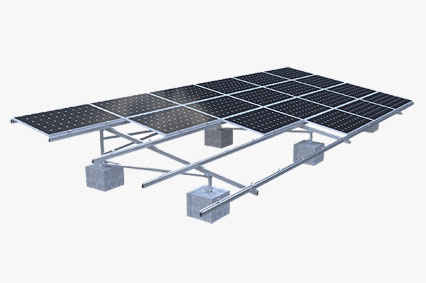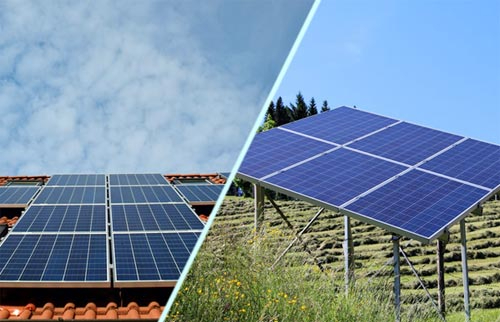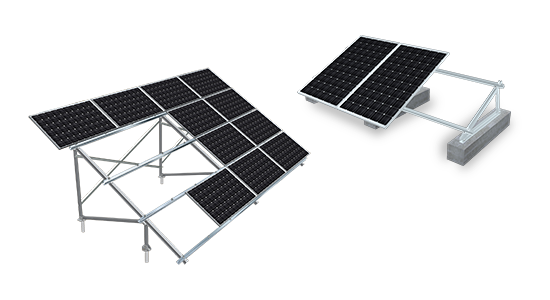-
 Ground solar mounting systems position solar panels on the ground, in contrast to rooftop installations. Rooftop systems integrate with the existing building structure, while ground panels depend on robust foundations to withstand wind, weather, and time. Your choice of foundation type impacts installation cost and speed, along with the overall stability and longevity of the solar array. In this article, you'll learn about different types of ground solar system foundations and related knowledge.
Ground solar mounting systems position solar panels on the ground, in contrast to rooftop installations. Rooftop systems integrate with the existing building structure, while ground panels depend on robust foundations to withstand wind, weather, and time. Your choice of foundation type impacts installation cost and speed, along with the overall stability and longevity of the solar array. In this article, you'll learn about different types of ground solar system foundations and related knowledge. -
 Klip-Lok roofing sheet is one of the primary steel roof profiles used in most roof and wall cladding projects across Australia, and while it's the priciest in the standard range, it also stands out as the most durable option. When it's time to install solar panels on your roof, Klip-Lok mounting clips, being a non-penetrating solution, preserve the integrity of your metal roof while delivering a secure, long-lasting hold.
Klip-Lok roofing sheet is one of the primary steel roof profiles used in most roof and wall cladding projects across Australia, and while it's the priciest in the standard range, it also stands out as the most durable option. When it's time to install solar panels on your roof, Klip-Lok mounting clips, being a non-penetrating solution, preserve the integrity of your metal roof while delivering a secure, long-lasting hold. -
 On-grid solar systems, also known as grid-tied systems, are becoming increasingly common in homes and businesses. They connect right to the public electricity grid, so you generate power and send any extra back. This lowers your bills and helps the planet. Plus, they're easy to install and require very little maintenance. If you're thinking about solar, it's a pretty appealing option.
On-grid solar systems, also known as grid-tied systems, are becoming increasingly common in homes and businesses. They connect right to the public electricity grid, so you generate power and send any extra back. This lowers your bills and helps the planet. Plus, they're easy to install and require very little maintenance. If you're thinking about solar, it's a pretty appealing option. -
 Agri-PV combines agriculture with photovoltaic technology. By integrating these systems, you maximize your land's potential without disrupting your livestock or crop cultivation. Our solar farmland mounting systems offer an outstanding cost-benefit ratio. We tailor farm solar mounting structures to your project plans. Whether you own open space or develop projects, we'll help you find the best solution.
Agri-PV combines agriculture with photovoltaic technology. By integrating these systems, you maximize your land's potential without disrupting your livestock or crop cultivation. Our solar farmland mounting systems offer an outstanding cost-benefit ratio. We tailor farm solar mounting structures to your project plans. Whether you own open space or develop projects, we'll help you find the best solution. -
 Installing solar panels on metal roofs with standing seams is straightforward. You can easily mount the modules directly onto the seams, eliminating the need to drill into the roof. However, if your roof is corrugated, the profile lacks the necessary strength to support the mounting system on its own. In this case, you must secure the brackets using screws.
Installing solar panels on metal roofs with standing seams is straightforward. You can easily mount the modules directly onto the seams, eliminating the need to drill into the roof. However, if your roof is corrugated, the profile lacks the necessary strength to support the mounting system on its own. In this case, you must secure the brackets using screws. -
 When deciding on solar installations for your business, farm, or home, it's helpful to understand both the advantages and potential setbacks of each option. We provide detailed comparisons of roof versus ground-mounted solar panels, including installation methods, costs, benefits, and possible disadvantages, to help you decide wisely.
When deciding on solar installations for your business, farm, or home, it's helpful to understand both the advantages and potential setbacks of each option. We provide detailed comparisons of roof versus ground-mounted solar panels, including installation methods, costs, benefits, and possible disadvantages, to help you decide wisely. -
 A mounting structure serves as the backbone of your solar system. It securely anchors solar panels across different settings, such as on roofs, parking areas, or bodies of water. If roof space proves limited or unsuitable, you can consider using pole-mounted solar panels on the ground.
A mounting structure serves as the backbone of your solar system. It securely anchors solar panels across different settings, such as on roofs, parking areas, or bodies of water. If roof space proves limited or unsuitable, you can consider using pole-mounted solar panels on the ground. -
 For those with corrugated metal roofs, you can still mount solar panels using brackets. These brackets secure direct embedment into the underlying structure by penetrating through the corrugated metal sheets, ensuring a highly secure fixation. Mibet provides mounting bracket kits for solar panels installed on corrugated or trapezoidal metal roofs, such as hanger bolts.
For those with corrugated metal roofs, you can still mount solar panels using brackets. These brackets secure direct embedment into the underlying structure by penetrating through the corrugated metal sheets, ensuring a highly secure fixation. Mibet provides mounting bracket kits for solar panels installed on corrugated or trapezoidal metal roofs, such as hanger bolts.


